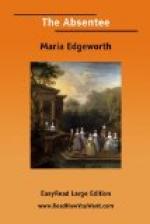With Lord Colambre she played more artfully; she drew him out in defence of his beloved country, and gave him opportunities of appearing to advantage; this he could not help feeling, especially when the Lady Isabel was present. Lady Dashfort had dealt long enough with human nature to know, that to make any man pleased with her, she should begin by making him pleased with himself.
Insensibly the antipathy that Lord Colambre had originally felt to Lady Dashfort wore off; her faults, he began to think, were assumed; he pardoned her defiance of good breeding, when he observed that she could, when she chose it, be most engagingly polite. It was not that she did not know what was right, but that she did not think it always for her interest to practise it.
The party opposed to Lady Dashfort affirmed that her wit depended merely on unexpectedness; a characteristic which may be applied to any impropriety of speech, manner, or conduct. In some of her ladyship’s repartees, however, Lord Colambre now acknowledged there was more than unexpectedness; there was real wit; but it was of a sort utterly unfit for a woman, and he was sorry that Lady Isabel should hear it. In short, exceptionable as it was altogether, Lady Dashfort’s conversation had become entertaining to him; and though he could never esteem or feel in the least interested about her, he began to allow that she could be agreeable.
‘Ay, I knew how it would be,’ said she, when some of her friends told her this. ’He began by detesting me, and did I not tell you that, if I thought it worth my while to make him like me, he must, sooner or later. I delight in seeing people begin with me as they do with olives, making all manner of horrid faces and silly protestations that they will never touch an olive again as long as they live; but, after a little time, these very folk grow so desperately fond of olives, that there is no dessert without them. Isabel, child, you are in the sweet line—but sweets cloy. You never heard of anybody living on marmalade, did ye?’—Lady Isabel answered by a sweet smile.—’To do you justice, you play Lydia Languish vastly well,’ pursued the mother; ’but Lydia, by herself, would soon tire; somebody must keep up the spirit and bustle, and carry on the plot of the piece; and I am that somebody—as you shall see. Is not that our hero’s voice, which I hear on the stairs?’
It was Lord Colambre. His lordship had by this time become a constant visitor at Lady Dashfort’s. Not that he had forgotten, or that he meant to disregard his friend Sir James Brooke’s parting words. He promised himself faithfully, that if anything should occur to give him reason to suspect designs, such as those to which the warning pointed, he would be on his guard, and would prove his generalship by an able retreat. But to imagine attacks where none were attempted, to suspect ambuscades in the open country, would be ridiculous and cowardly.
‘No,’ thought our hero; ’Heaven forfend I should be such a coxcomb as to fancy every woman who speaks to me has designs upon my precious heart, or on my more precious estate!’ As he walked from his hotel to Lady Dashfort’s house, ingeniously wrong, he came to this conclusion, just as he ascended the stairs, and just as her ladyship had settled her future plan of operations.




